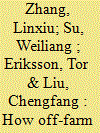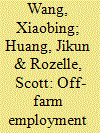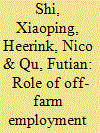|
|
|
Sort Order |
|
|
|
Items / Page
|
|
|
|
|
|
|
| Srl | Item |
| 1 |
ID:
147422


|
|
|
|
|
| Summary/Abstract |
While it is widely accepted that industrialization has brought both environmental pollution and economic growth in rural areas of China, very little is known about whether the negative effects of industrial pollution on rural residents have been proportionally offset by positive effects due to improvements in off-farm income. This paper improves our understanding of these tradeoffs by conducting an empirical analysis based on a set of nationwide panel data collected in 2008 and 2012 and covering five provinces, 101 villages, and 2020 households. Evidence is found to suggest that it is not always the case that rural households that are affected by pollution reap the off-farm employment benefits associated with industrialization. Specifically, although industrial pollution incidence is found to be positively related with the level of local off-farm employment, this relationship is statistically insignificant when migrant labor is included. It can be explained as areas that less economically benefited from industrialization tent to have more labors migrated out and the average annual wage income of one migrant labor is much higher than that of local off-farm labor.
|
|
|
|
|
|
|
|
|
|
|
|
|
|
|
|
| 2 |
ID:
145581


|
|
|
|
|
| Summary/Abstract |
Using three-wave survey data for four villages of Jiangsu Province in China, the present paper examines whether and to what extent off-farm employment affects the technical efficiency of agricultural production. The level of technical efficiency is measured using a stochastic frontier production function approach. Based on estimation results from instrumental variable panel quantile regressions we find that there is a positive significant effect of off-farm employment on the level of farm technical efficiency. We also find that fragmentation of farmland is a barrier to the improvement of technical efficiency. In addition, we find a downward trend in the level of agricultural technical efficiency among our sample. Therefore, the Chinese Government should stimulate agricultural mechanization and the development of farming techniques to improve technical efficiency in the context of increasing off-farm employment.
|
|
|
|
|
|
|
|
|
|
|
|
|
|
|
|
| 3 |
ID:
101160


|
|
|
|
|
| Publication |
2010.
|
| Summary/Abstract |
This paper performs a plot-level analysis of the impact of land rental market participation and off-farm employment on land investment, input use, and rice yields for 215 plots cultivated by 52 households in three villages in Northeast Jiangxi Province. Our findings show that households that rent extra land are relatively more productive, but contradict results of earlier studies which found that tenure status of plots affects the level of land investments. We further find that off-farm employment does not significantly affect rice yields. This result contradicts those of earlier studies which found that the negative lost-labor effect of off-farm employment dominates the positive income effect. Another novel finding is that people working locally off-farm tend to switch from green manure planting towards the use of organic manure on their rice plots. We conclude that policies that will further stimulate the development of land rental markets, which is still in its infancy, can contribute significantly to higher rice production in Southeast China. Another implication of our results is that worries about the negative impact that the continuously growing off-farm employment may have on China's goal to remain self-sufficient in grain production are less relevant at the moment for the region examined in our study.
|
|
|
|
|
|
|
|
|
|
|
|
|
|
|
|
| 4 |
ID:
159027


|
|
|
|
|
| Summary/Abstract |
While it is well known that China's off farm labor market is emerging rapidly, less is known about the effect of movement off the farm on the farming practices of those that have continued to farm. The overall goal of this paper is to analyze the effects of changes in China's off farm employment on one aspect of the performance of China's agricultural sector: the emergence of specialization in farming. To achieve this goal, we have three specific objectives. First, we document the changes in the flow of labor out of China's villages. Second, we examine how specialization in farming has changed over time. Third, we examine the association between off farm labor flows and specialization. Using panel data from a national representative data collected by the authors between 1999 and 2008, the analysis finds that off farm employment is indeed rising rapidly. At the same time, specialization is occurring off and on the farm. There is a strong and robust correlation between off farm employment and on farm specialization. The results imply that China's agriculture has responded dynamically to the modernization happening elsewhere in the economy.
|
|
|
|
|
|
|
|
|
|
|
|
|
|
|
|
| 5 |
ID:
089580


|
|
|
|
|
| Publication |
2009.
|
| Summary/Abstract |
The goal of this study is to assess the dynamics of rural households' labor market participation in the wake of China's efforts to develop rural labor markets in a manner that is conducive to its transition to a market economy. Based on a theoretical model that emphasizes the impact of duration, i.e. of the number of years households spent part-time farming or full-time farming, respectively, we investigate the shifts between these two states. We also identify socioeconomic factors that determine these shifts. The empirical study is based on discrete time hazard approaches, using micro-level panel data from Zhejiang, Hubei, and Yunnan provinces from 1995 to 2002.
|
|
|
|
|
|
|
|
|
|
|
|
|
|
|
|
| 6 |
ID:
089579


|
|
|
|
|
| Publication |
2009.
|
| Summary/Abstract |
Energy consumption in rural areas in China is characterized by high consumption of fuelwood, straw and other biomass. Off-farm employment can play an important role in the transition towards more sustainable sources of energy by increasing rural household incomes and reducing the amount of labor available for biomass collection. The purpose of this paper is to examine the impact of off-farm employment on rural household energy consumption choices, and to disentangle the various causal relationships that play a role in this respect. To this end, a hybrid farm household/village computable general equilibrium (CGE) model is used that has been calibrated for a remote village in Northeast Jiangxi Province where fuelwood is the main source of energy. The model takes into account nonseparability of farm household production and consumption decisions as well as linkages within the village between households involved in off-farm employment and households with no members working off-farm. Contrary to previous research for a richer region in rural China, we find that fuelwood is not an inferior good. The positive impact of more food consumption on fuelwood collection more than compensates the higher leisure demand associated with higher incomes. Shifts in production activities and in prices on village factor markets caused by increased labour scarcity (the lost-labour effect of off-farm employment), on the other hand, cause a reduction in fuelwood collection and consumption. This lost-labour effect is much stronger for migration than for local off-farm employment, because the latter can more easily be combined with on-farm work and fuelwood collection. For local off-farm employment the income effect dominates the lost-labour effect, resulting in a positive overall impact of higher off-farm participation on fuelwood consumption. For migration, on the other hand, the income effect and the lost-labour effect are almost equal in size. Hence, the amount of fuelwood collected and consumed does not change much when households participate in migration. The final conclusion is therefore that increased off-farm employment opportunities do not promote the transition of rural energy use in the poorer regions of rural China.
|
|
|
|
|
|
|
|
|
|
|
|
|
|
|
|
| 7 |
ID:
100755


|
|
|
|
|
| Publication |
2010.
|
| Summary/Abstract |
Economic reforms in rural China have brought opportunities to diversify both within-farm activities and off-farm activities. Participation in these activities plays an important role in increasing rural households' income. This paper analyzes the factors that drive rural households and individuals in their income-source diversification choices in a Northern China township. At the household level, we distinguish three types of diversification as opposed to grain production only: within-farm (non-grain production) activities, local off-farm activities, and migration. We find that land availability stimulates on-farm diversification. Local off-farm activities are mostly driven by households' asset positions and working resources, while migration decisions strongly depend on the household size and composition. At the individual level, we analyze the determinants of participation in three different types of jobs as compared to agricultural work: local off-farm employment, local self-employment and migration. We find a clear gender and age bias in access to off-farm activities that are mostly undertaken by male and by young people. The households' asset positions as well as village networks are found to strongly affect participation in off-farm activities.
|
|
|
|
|
|
|
|
|
|
|
|
|
|
|
|
|
|
|
|
|